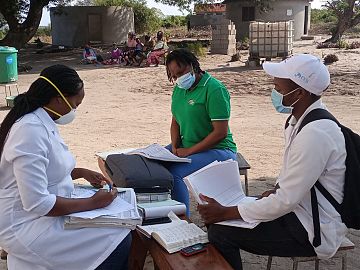American Journal of Tropical Medicine and Hygiene articles explore effective malaria surveillance systems
26 April 2022 Teams undertaking malaria data quality assessments in Mozambique
Teams undertaking malaria data quality assessments in MozambiqueThe first of three malaria surveillance supplemental issues in the American Journal of Tropical Medicine and Hygiene (AJTMH) was published yesterday on World Malaria Day, exploring the importance of responsive surveillance – the ongoing collection, collation and analysis of health-related data for effective decision-making – as a core malaria intervention.
The goal of gathering disease intelligence is to empower decision-makers to lead and manage programmes more effectively by providing timely, useful health related data through surveillance and/or monitoring and evaluation systems. Since surveillance directly measures population, it is useful both for measuring the need for malaria interventions and for directly measuring the effects of these interventions.
Since the World Health Organization (WHO) published its malaria surveillance, monitoring and evaluation guidelines in 2015, a few papers on using surveillance have been published particularly in areas of burden reduction. For the first time, these three supplements will consolidate practical examples of surveillance system improvements and challenges in different malaria transmission settings and address potential disruptions to the surveillance system, including COVID-19, and ways these systems can adjust to mitigate setbacks in accelerating progress towards malaria elimination across endemic settings. The key domains of surveillance will also be covered including collecting, recording, reporting, analysis, presentation, interpretation, evaluation, dissemination, and use.
The first article, co-authored by researchers from Malaria Consortium, National Malaria Control Programmes (NMCP) in Mozambique and Senegal, the US President’s Malaria Initiative (PMI) and The Global Fund to Fight AIDS, Tuberculosis and Malaria (GFATM), was published in the AJTMH on World Malaria Day.
Dr Arantxa Roca-Feltrer, Malaria Consortium’s Head of Surveillance, Monitoring and Evaluation, commented:
“A fully operational surveillance system that effectively links data quality, data use, and data to action components will ultimately lead to a resilient and robust system capable of responding to all malaria transmission contexts, driving progress towards malaria elimination.”
A malaria surveillance system is considered functional and responsive when it can produce evidence-based information that is routinely used for planning and decision-making. Adaptive surveillance and information systems undergo continuous improvement cycles that are triggered by evolving country-specific malaria epidemiological factors as well as changing external factors. This leads to a resilient and robust system capable of responding to all situations and reaching malaria elimination.
The second surveillance supplement, to be published in AJTMH July 2022, will explore how data can be used for decision-making including considerations around quality checking, analysis, visualisation, and use. The third supplement, expected in November 2022, will assess the performance of a functional malaria surveillance system.
Related content
2 March 2022
Improving malaria surveillance through existing community structures: Lessons learnt from Ethiopia
11 March 2021Strengthening surveillance for data-informed malaria control activities
22 July 2021Malaria Consortium highlights vital role of responsive surveillance systems in eliminating malaria
Building a strong surveillance system in Mozambique
Latest news
- Malaria Consortium honoured by Ugandan government for contribution to combat malaria23rd April 2024
- International summit calls for AMR accountability in public health interventions21st March 2024
- Global SMC community celebrates new milestone at SMC Alliance Annual Meeting in Nigeria6th March 2024
- Scaling up key interventions could halve pneumonia-related childhood mortality13th February 2024
- Malaria Consortium and eGov Foundation join Mozambique’s national malaria programme to digitalise seasonal malaria chemoprevention campaigns8th February 2024
- World’s first malaria vaccine rollout launched in Cameroon22nd January 2024